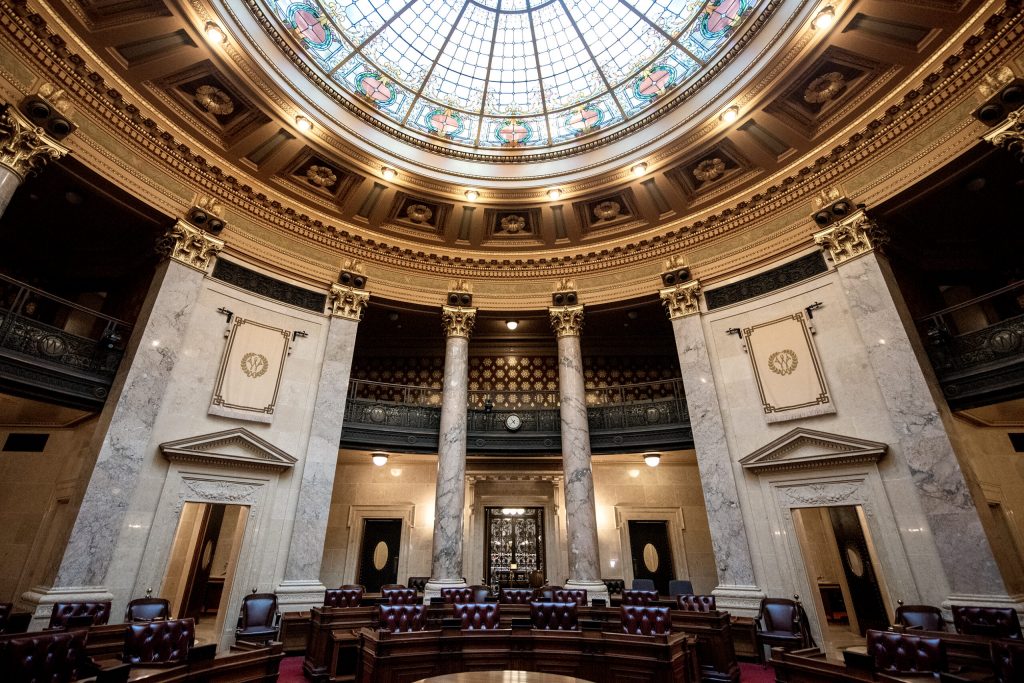What Will Wisconsin Spend $4.6 Billion Surplus On?
Next budget will have room for investment but Policy Forum expert says lawmakers will need caution.

The Wisconsin State Senate chambers on Thursday, Dec. 14, 2023, at the Wisconsin State Capitol in Madison, Wis. Angela Major/WPR
Wisconsin ended its 2024 fiscal year in June with a larger-than-expected $4.6 billion state budget surplus.
The surplus is over a billion dollars more than predicted earlier this year, but well below the $7.1 billion left over at the end of the last budget cycle.
Gov. Tony Evers and the state Department of Administration released a new Annual Fiscal Report on Tuesday highlighting the surplus and showing the state’s “rainy day” fund hit a record-high of $1.9 billion.
In May, the state’s nonpartisan Legislative Fiscal Bureau estimated the surplus at the end of the 2024 fiscal year would be around $3.25 billion. At the end of the 2025 fiscal year, next June, the fiscal bureau projected the surplus would be around $3.13 billion.
Wisconsin Policy Forum President and Research Director Jason Stein said the surplus came in above previous estimates, in part, because tax revenues were about $275.7 million higher than projected and state spending came in about $423 million below projections.
The $423.3 million in spending was budgeted to go into the state’s fund for building projects in 2024 but will go into the fund in the 2025 fiscal year. That means the surplus is actually closer to $4.2 billion, which is still above projections, Stein said.
He also said the surplus declining from roughly $7 billion is “appropriate,” saying that record surplus was higher than it “ever needed to be.”
Stein estimates that about $1.25 billion of the surplus left at the end of the last budget cycle went toward funding building projects and road projects.
“Those are sort of appropriate one-time uses of a one-time surplus because the state does not have to keep appropriating those funds every year,” Stein said. “However, the state is starting to get to the point now where ongoing spending is higher than ongoing revenues.”
He added that the state is expected to end the current two-year budget period with a surplus of more than $3 billion. He said that gives the governor and the Legislature room to make additional investments in the next budget, but they will need to do so “with a little bit more caution.”
In a statement, Evers said the state is in “one of the best fiscal positions” in its history, calling it a “testament to the hard-working folks” around the state.
He said the surplus will inform how he prepares the next two-year state budget with the goal of addressing “needs that have long been neglected.” He said that includes stabilizing the child care industry, investing in public education and addressing rising costs would be a top priority in that next budget.
“We have a historic opportunity this next session to continue building upon the future we want for our state, and I’m looking forward to bringing folks together to get it done this next legislative session,” Evers said.
After Evers released the surplus numbers, State Superintendent Jill Underly called for increasing funding for K-12 education. In a statement, she said “too many of our school districts across the state are forced to go to referendum just to keep the lights on.”
At the same time, the Universities of Wisconsin system is calling for an $855 million state funding increase in the next two-year budget. And some expect Republicans in the Legislature will push for tax cuts.
Stein said neither the governor nor the Legislature are expected to have an appetite for a tax increase to boost revenues, so it’s unlikely that all stakeholders will get everything they want in the next budget.
“There’s not the ability for the state to make those permanent commitments, ongoing commitments at the levels that people wanted to see them,” he said. “Because you can’t do everything, that’s where the prioritization and the horse trading in the budget comes into play.”
Wisconsin ends 2024 fiscal year with $4.6B surplus, down from $7B record but above projections was originally published by Wisconsin Public Radio.
If you think stories like this are important, become a member of Urban Milwaukee and help support real, independent journalism. Plus you get some cool added benefits.






















4.6 billion has one seen the roads?
Upgrade UW system. College students is the best way to grow this aging state and create tax revenue.
How about making sure that the City and County of Milwaukee gets their fair share of shared revenue, instead of whatever smaller amount Robin Vos and Friends determine from spinning their annual Wheel of Misfortune?
We need to upgrade our infrastructure from ensuring all Wisconsin residents have access to high speed broadband, to educational institutions, buildings, teachers and teacher training, roads and bridges as well as lead leads replacement. This is not so much a surplus as investments in our state institutions, citizens, small businesses and entrepreneurs, public transportation–not just in our cities–across the state, AND making major investments in the state’s economic drivers, UW system, community/technical colleges, agriculture–preferably our family farms, and our major cities–Milwaukee, Green Bay, Eau Claire, Wausau, Appleton, Oshkosh, La Crosse, Racine/Kenosha, Janesville/Beloit, Madison. We could also invest in tourism including protecting our state parks and nature preserves and national forests.
The thing about using our surplus as means for investing in our state is the financial returns are far greater for Wisconsin residents than a one time tax cut.